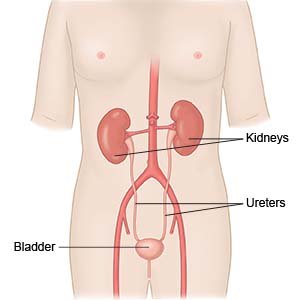Robot Assisted Cystectomy
Medically reviewed by Drugs.com. Last updated on Aug 4, 2025.
Robot assisted cystectomy (RAC) is surgery to remove part or all of your bladder through small incisions in your abdomen. RAC is done with a machine that is controlled by your surgeon. The machine has mechanical arms that use small tools to remove your bladder.
 |
DISCHARGE INSTRUCTIONS:
Call your local emergency number (911 in the US) if:
- You have chest pain.
- You feel lightheaded or short of breath.
- You cough up blood.
Seek care immediately if:
- Your arm or leg feels warm, tender, and painful. It may look swollen and red.
- You make less urine than usual or not at all.
- You have severe pain.
- Your stitches or staples come apart.
- Blood soaks through your bandage.
- Your incision sites or stoma are swollen, red, or draining pus.
Related medications
Call your doctor if:
- You have a fever.
- You have nausea, or you vomit.
- You have pain even after taking medicine.
- You have questions or concerns about your condition or care.
Medicines:
You may need any of the following:
- Antibiotics prevent or treat a bacterial infection.
- Bowel movement softeners help prevent constipation.
- Prescription pain medicine may be given. Ask your healthcare provider how to take this medicine safely. Some prescription pain medicines contain acetaminophen. Do not take other medicines that contain acetaminophen without talking to your healthcare provider. Too much acetaminophen may cause liver damage. Prescription pain medicine may cause constipation. Ask your healthcare provider how to prevent or treat constipation.
- Take your medicine as directed. Contact your healthcare provider if you think your medicine is not helping or if you have side effects. Tell your provider if you are allergic to any medicine. Keep a list of the medicines, vitamins, and herbs you take. Include the amounts, and when and why you take them. Bring the list or the pill bottles to follow-up visits. Carry your medicine list with you in case of an emergency.
Care for the incision sites as directed:
Wear loose-fitting clothing over the area. Do not get the sites wet until your healthcare provider says it is okay. When it is okay to bathe, do not scrub the sites. Just let water run over them. Dry the area and put on new, clean bandages as directed. Change your bandages when they get wet or dirty. Do not put powders or lotions over your incision sites. Check the area every day for signs of infection, such as swelling, redness, or pus.
Follow up with your doctor as directed:
Write down your questions so you remember to ask them during your visits.
© Copyright Merative 2025 Information is for End User's use only and may not be sold, redistributed or otherwise used for commercial purposes.
The above information is an educational aid only. It is not intended as medical advice for individual conditions or treatments. Talk to your doctor, nurse or pharmacist before following any medical regimen to see if it is safe and effective for you.
Further information
Always consult your healthcare provider to ensure the information displayed on this page applies to your personal circumstances.
